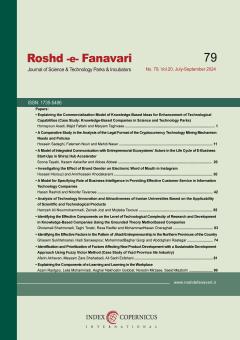Identifying the effective factors in the pattern of jihadi entrepreneurship in the northern provinces of the country
Subject Areas : Entrepreneurship and Mnagement of Knowledge-based FirmsGhasem Sukhtehsaraii 1 , Hadi Sanaeepour 2 , Mohammad Bagher Gorji 3 , Abdol gane Rastgar 4
1 - Department of Entrepreneurship, Aliabad Katul branch, Islamic Azad University, Aliabad Katul, Iran.
2 - Department of Management, Azadshahr Faculty of Humanities, Gonbadgavos University, Gonbadgavos, Iran
3 - Department of Entrepreneurship, Aliabad Katul branch, Islamic Azad University, Aliabad Katul, Iran
4 - Department of Management, Azadshahr Faculty of Humanities, Gonbadgavos University, Gonbadgavos, Iran.
Keywords: Jihadi entrepreneurship model, social entrepreneurship, entrepreneurial spirit, value creation, jihadi work culture, foundation data method,
Abstract :
The purpose of this research is to identify the effective factors in the pattern of jihadi entrepreneurship in the northern provinces of the country. The current research is a type of qualitative research, in which the model of jihadi entrepreneurship in the northern provinces of the country has been designed by using research methods with a focus on deep and semi-structured interviews. For this purpose, several steps have been taken. In the first stage, concepts were extracted by using the theoretical foundations, research background, as well as by using the foundation data method, in-depth and semi-structured interviews and soliciting opinions from selected experts. In this research, 20 experts from the industry sector in the field of jihadi entrepreneurship and people who had experience in jihadi entrepreneurship and research participated. It should be noted that with 16 interviews, theoretical saturation was achieved and no new data was added to the previous data, but the process of conducting interviews continued until 20 interviews. The identification of research components was done using the foundation data method, i.e. open, axial and selective coding. In the qualitative part, the decision-making team included professors and experts, key informants, jihadi entrepreneurs in the industrial sector identified in the northern provinces of the country, and experts on this issue in support institutions, including the aid committee. Identification of people was done in a targeted way. The result of this step was to identify the main and sub-components and dimensions of the jihadi entrepreneurship model design in the northern provinces of the country, and in total, 139 coders were identified; 39 core codes and 10 selective codes resulted.
1. احمدپور، محمود و مقیمی، سیدمحمد، "مبانی کارآفرینی"، انتشارات دانشگاه تهران، 1395.
2. علی میری، مصطفی،" آموزش کارآفرینی: پیدایش، توسعه، گرایشها و چالشها، توسعه کارآفرینی"، شماره1، صفحات 131-167، 1387.
https://www.sid.ir/fa/journal/ViewPaper.aspx?id=83299 3. یداللهی فارسی، جهانگیر، " نقش جدید دانشگاه ها: توسعه قابلیت های کارآفرینی"، دومین کنفرانس اشتغال و نظام آموزش عالی، تهران، 1384https://civilica.com/doc/33513
4. سبحانی، حسن، احقاقی، میثم و نادری، اسماعیل،"کارآفرینی از منظر ادیان توحیدی با تاکید بر نظام اقتصادی اسلام"، فصلنامه توسعه کارآفرینی، شماره 5، صفحات 169-188، 1391.
5. خنیفر، حسین، "کارآفرینی در نظام ارزشی"، قم : انتشارات اکرام، 1386.
6. فانی، علی اصغر، مهتری آرانی، محمد، مشبکی اصفهانی، اصغر و عصاری آرانی، عباس، "طراحی مختصات فرهنگ جهادی در شرکت¬های متوسط و بزرگ"، فصلنامه مدیریت اسلامی، شماره 27، صفحات 13-36، 1398.
ه آراستی، زهرا، سفیدگر، افروز و زعفریان، رضا، "تبیین نقش مؤلفههای فردی، محیطی و، سیستمی در موفقیت آموزش الکترونیکی کارآفرینی دانشگاه تهران"، فصلنامه توسعه کارآفرینی، شماره 8، صفحات 61-79، 1394.
8. حجازی، سیدرضا، تبیین رفتار کارآفرینانه در پرتو مفهوم شاکله دینی، فصلنامه توسعه کارآفرینی، شماره 5 ، 1391.
9.
R. D. Hisrich, “Entrepreneurship/intrapreneurship. Entrepreneurship: Critical Perspectives on Business and Management”, vol. 3, pp. 304, 2002. 10.
D. B. Audretsch, D.F. Kuratko, A.N. Link, “ Making sense of the elusive paradigm of entrepreneurship”. Small business economics, vol. 45, pp. 703-712, 2015. 11.
C. Brooks, T. Vorley, C..Gherhes, “Entrepreneurial ecosystems in Poland: panacea, paper tiger or Pandora’s box?”. Journal of Entrepreneurship and Public Policy, 2009. 12.
M. Yunus & K. Weber, “Creating a world without Poverty: Social business and the future ofcapitalism”. New York: Public A, 2017. 13. K. Śledzik, “Schumpeter’s view on innovation and entrepreneurship. Management Trends in Theory and Practice”, (ed.) Stefan Hittmar, Faculty of Management Science and Informatics, University of Zilina & Institute of Management by University of Zilina, 2013
. 14.
M.S. Sandeep, M.N. Ravishankar, “Social innovations in outsourcing: An empirical investigation of impact sourcing companies in India”. The Journal of Strategic Information Systems, vol. 24, pp. 270-288, 2015.


